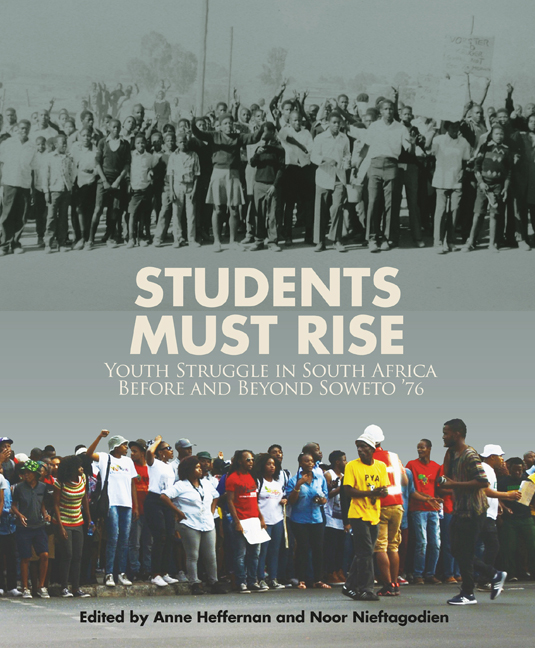Book contents
- Frontmatter
- Acknowledgements
- Contents
- Timeline
- Map Of South Africa
- Glossary
- Abbreviations
- Introduction: narratives of the student struggle
- Chapter 1 A brief history of the African Students’ Association
- Chapter 2 Youth and student culture: Riding resistance and imagining the future
- Chapter 3 The role of religion and theology in the organisation of student activists
- Chapter 4 Student organisation in Lehurutshe and the impact of Onkgopotse Abram Tiro
- Chapter 5 The University of the North: A regional and national centre of activism
- Chapter 6 Action and fire in Soweto, June 1976
- Chapter 7 What they shot in Alex
- Chapter 8 SASO and Black Consciousness, and the shift to congress politics
- Chapter 9 Youth politics and rural rebellion in Zebediela and other parts of the “homeland” of Lebowa, 1976–1977
- Chapter 10 My Journey, our journey: Activism at Ongoye University
- Chapter 11 ‘Let's begin to participate fully now in politics’: Student politics, Mhluzi township, 1970s
- Chapter 12 ‘They would remind you of 1960’: The emergence of radical student politics in the Vaal Triangle, 1972–1985
- Chapter 13 The ends of boycott
- Chapter 14 Fighting for ‘our little freedoms’: The evolution of student and youth politics in Phomolong township, Free State
- Chapter 15 ‘Every generation has its struggle’: A brief history of Equal Education, 2008–15
- Chapter 16 Contemporary student politics in South Africa: The rise of the black-led student movements of #RhodesMustFall and #FeesMustFall in 2015
- Selected Bibliography
Chapter 15 - ‘Every generation has its struggle’: A brief history of Equal Education, 2008–15
Published online by Cambridge University Press: 21 April 2018
- Frontmatter
- Acknowledgements
- Contents
- Timeline
- Map Of South Africa
- Glossary
- Abbreviations
- Introduction: narratives of the student struggle
- Chapter 1 A brief history of the African Students’ Association
- Chapter 2 Youth and student culture: Riding resistance and imagining the future
- Chapter 3 The role of religion and theology in the organisation of student activists
- Chapter 4 Student organisation in Lehurutshe and the impact of Onkgopotse Abram Tiro
- Chapter 5 The University of the North: A regional and national centre of activism
- Chapter 6 Action and fire in Soweto, June 1976
- Chapter 7 What they shot in Alex
- Chapter 8 SASO and Black Consciousness, and the shift to congress politics
- Chapter 9 Youth politics and rural rebellion in Zebediela and other parts of the “homeland” of Lebowa, 1976–1977
- Chapter 10 My Journey, our journey: Activism at Ongoye University
- Chapter 11 ‘Let's begin to participate fully now in politics’: Student politics, Mhluzi township, 1970s
- Chapter 12 ‘They would remind you of 1960’: The emergence of radical student politics in the Vaal Triangle, 1972–1985
- Chapter 13 The ends of boycott
- Chapter 14 Fighting for ‘our little freedoms’: The evolution of student and youth politics in Phomolong township, Free State
- Chapter 15 ‘Every generation has its struggle’: A brief history of Equal Education, 2008–15
- Chapter 16 Contemporary student politics in South Africa: The rise of the black-led student movements of #RhodesMustFall and #FeesMustFall in 2015
- Selected Bibliography
Summary
Equal Education (EE) is a movement of high school students, parents, teachers and community members campaigning for quality and equality in the South African education system. Established in 2008 in Khayelitsha in the Western Cape, EE was the idea of veteran activist Zackie Achmat, co-founder of the Treatment Action Campaign (TAC). EE is a membership-based movement that organises high school students in branches across the country, and uses research, social mobilisation and the law to ensure that students’ constitutional right to education is realised and the legacy of colonial and apartheid education undone.
EE's first organisers and leaders were UCT law graduates Doron Isaacs and Yoliswa Dwane, who started working full-time for what was then called the Applied Education Research Organisation (AERO) on 1 February 2008. Achmat had called the first meeting of AERO at his home in Muizenberg, Cape Town on 14 December 2006, and had two researchers start summarising education research. Isaacs and Dwane recruited a team of organisers – Lumkile Zani, Lwandiso Stofile, Nokubonga Yawa and Joey Hasson – and set up a small office in the SHAWCO Centre in Khayelitsha.
Together, the group spent the initial months sitting in classrooms in Khayelitsha, observing and learning, and coming together in the afternoon to discuss what they had seen and to run seminars for themselves. The group also drew on the experience of members of the EE Board, including Achmat and Professor Mary Metcalfe, the ANC's first MEC for Education in Gauteng, as well as other important advisors like Professor Paula Ensor, then head of the School of Education at UCT, Professor Crain Soudien and Advocate Rob Peterson.
EE was modelled on the TAC, which, since its founding in 2008, had successfully campaigned for a public antiretroviral treatment programme, doing battle with a government led by an AIDS denialist, former President Thabo Mbeki, and superprofiting drug companies. The TAC had developed an approach to struggle which EE would emulate, grounding its claims in the rights contained in the Constitution, while basing its power in a politicised, informed and organised mass membership.
- Type
- Chapter
- Information
- Students Must RiseYouth struggle in South Africa before and beyond Soweto ’76, pp. 168 - 179Publisher: Wits University PressPrint publication year: 2016



